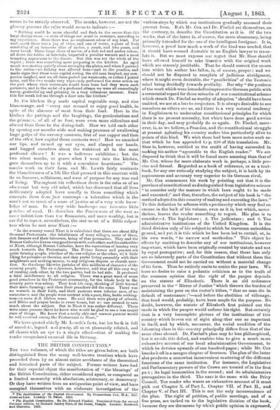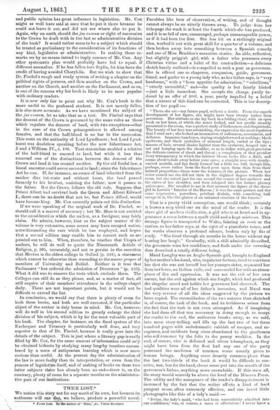THE BRITISH CONSTITUTION..
THE two volumes, of which the titles are given below, are both distinguished from the many well-known treatises which have preceded them by an almost entire avoidance of the theoretical and historical parts of the subject. Former writers have had for their especial object the manifestation of "the blessings" of the British Constitution, either considered apart, or compared as a limited monarchy with absolutism, aristocracy, or democracy. Or they have written from an antiquarian point of view, and have occupied themselves with an elaborate investigation of the " The hislitertions qf the English Gotertunent. By Homershant Cox, MA., Bar- rister-at-Law. London: H. Sweet. 1863.
* me Eaglish Constitution. By Dr. Edward FischeL Translated from the second German edition, by Richard Jenery blee, of the Inner. Temple. London: Bosworth and Harrison. 1863.
seem to be strictly observed. The monks, however, are not the I various steps by which our institutions gradually assumed their
present form. Bath Mr. Cox and Dr. Fischel set themselves, on the contrary, to describe the Coastitution as it is. Of the two works, that of the latter is, of course, the more elementary, being primarily intended for the use of the intelligent foreigner. It is, however, a proof how much a work of the kind was needed, that it should have seemed desirable to an English lawyer to trans- late it. But we must express our regret that Mr. Stift should have allowed himself to take liberties with the original work which are scarcely justifiable. That he should correct the errors into which his author has fallen, is, of course, proper ; and we should not be disposed to complain of judicious abridgment, where it might seem desirable, the "proclivities" of the Teutonic mind being decidedly towards prolixity. But why " the portions. of the work which were intended to impress the German public with a reverential regard for those minutite of our constitutional scheme which struck Dr. Fischel as worthy of adoption " should have been omitted, we are at a loss to conjecture. It is always desirable to see ourselves as others see us, and there is a very natural tendency in Englishmen to undervalue constitutional principles for which there is no present necessity, but which have done good service in their day, and may probably do so again. Dr. Fischel, more- over, is, as we believe, a Prussian, and the constitutional struggle at present agitating his country makes hint particularly alive to points of this kind. We wish there had been more notes such as- that winch he has appended ta p. 258 of this translation. Mr.. Shee is, however, entitled to the credit of having succeeded in making his author "agreeable to the English reader." We are disposed to think that it will be found more amusing than that of Mr. Cox, whose far more elaborate work is, perhaps, a little pre- cise and formal. Regarded as a book of reference, or as a text- book, for any one seriously studying the subject, it is both by its copiousness and accuracy very superior to its German rival.
Mr. Cox commences his work by pointing out that it is the province of constitutional as distinguished from legislative science "to consider only the manner in which laws ought to be made and executed ;" and that, therefore, the subject of his book is " the method adopted in this country of making and executing the laws." To this definition he adheres with a pertinacity which may find an, excuse in the bulk of his volume, even as it is, but which, never- theless, leaves the reader something to regret. His plan is to consider—I. The legislature ; 2. The judicature; and 3. The adtninistrative institutions of the United Kingdom. It is the third division only of his subject in which he traverses untrodden ground, and yet it is this which he has been led to curtail, or, in his own words, "to narrow and methodize." This object he effects by omitting to describe any of our institutions, however important, which have been originally created by statute and not by royal prerogative; and, for this reason, that these last only are so inherently parts of the Constitution that without them the Government could not be carried on without a material change of its form. Thus he entirely omits to notice the poor laws. 'We have no desire to raise a pedantic criticism as to the truth of the common opinion that the right of the pauper depeuds on the statute of Elizabeth. There is an old ordinance preserved in the " Mirror of Justice" which throws the burden of maintaining the poor on the rector's tithes, "that no man die in default of sustenance :"—and before the abolition of villenage, that fund would, probably, have been ample for the purpose. No doubt, however, the statute of Elizabeth first pointed out the mode in which the pauper would enforce his right. But certainly that is a very incomplete picture of the institutions of this country which leaves out of sight altogether one so important in itself, and by which, moreover, the social condition of the labouring class in this country principally differs from that of the same class abroad. Dr. Fischers plan may be less philosophical, but it avoids this defect, and enables him to give a much more exhaustive account of our local administrative Government, to which he devotes upwards of one hundred pages ; while Mr. Cox knocks it off in a meagre chapter of fourteen. The plan of the latter also produces a somewhat inconvenient scattering of the different functions of the same institution. For instance, the Legislative and Parliamentary powers of the Crown are treated of in the first pa: t; its legal immunities in the second ; and its administrative prerogatives in the third. The case is the same with the Privy Council. Tate reader who wants an exhaustive account of it must pick out Chapter X. of Part I., Chapter VII. of Part IL, and Chapter V. of Part III. This is not the only inconvenience of the plan. The right of petition, of public meetings, and of a free press, are tacked on to the legislative division of the book, because they are the means by which public opinion is expressed,
and public opinion has great influence in legislation. Mr. Cox might as well have said at once that he put it there because he could not leave it out, and did not see where else to put it. Again, why on earth should the jus corona or right of succession to the Crown be dealt with in the last or administrative division of the book? It would rather seem to be a subject which should be treated as preliminary to the consideration of its functions of any kind, legislative or administrative. In making these re- marks we by no means intend to imply censure of Mr. Cox. Any other systematic plan would probably have led to equal, if different anomalies. If he has fallen into Scylla, let him have the credit of having avoided Charybdis. But we wish to show that Dr. Fischel's rough and ready system of writing a chapter on the political rights of persons, and then another on the Crown, and another on the Church, and another on the Parliament, and so on, is one of the reasons why his book is likely to be more popular with ordinary readers.
It is now only fair to point out why Mr. Cox's book is the more useful to the professed student. It is not merely fuller, it is also more accurate. As we have mentioned the subject of the fur corona, let us take that as a test. Dr. Fische' says that the descent of the Crown is governed by the same rules as those which regulate the descent of land, with two exceptions—that in the case of the Crown primogeniture is allowed among females, and that the half-blood is no bar to the succession. This rests on the authority of Lord Lyndhurst ; but Lord Lynd- hurst was doubtless speaking before the new Inheritance Act, 3 and,' William. IV., c. 106. That statutehas enabled a relative of the half-blood to succeed to land, but while it has thus removed one of the distinctions between the descent of the Crown and land it has created another. By the old feudal law, a lineal ancestor could never succeed to land ; since the Inheritance Act he can. If, for instance, an owner of land inherited from the mother dies intestate and without issue, the land passed formerly to his brother, omitting the father ; now it passes to the father. Bat the Crown follows the old rule. Suppose that Prince Albert hail survived both the Queen and Albert Edward I., there can be no doubt that not he, but Prince Alfred, would have become king. Mr. Cox correctly points out this distinction.
If we were speaking of the original work of Dr. Fische], we should call it a marvel of accuracy ; but Mr. Shee is not entitled to the consideration which the author, as a foreigner, may fairly claim. He admits, however, that as the subject matter of the volume is very extensive, some errors may have escaped notice, notwithstanding the care which he has employed, and hopes that a second edition may enable him to correct such as are pointed out to him. When, therefore, he reaches that Utopia of authors, he will do well to quote the Nineteenth Article of Religion, p. 205, accurately, and not to persist in the assertion that Merton is the oldest college in Oxford (p. 223), a- statement which cannot be otherwise than wounding to the amour propre of members of University and Balliol. Neither is it true that Parliament " has ordered the admission of Dissenters "(p. 225). What it did was to remove the tests which exclude them. The Colleges can still do as they please, and, as a matter of fact, all still require of their members' attendance in the college chapel daily. These are not important points, but it would not be difficult to extend the list.
In conclusion, we would say that there is plenty of room for both these books, and both are well executed, if the particular object of the author is duly borne in mind. Mr. Cox, however, will do well in his second edition to greatly enlarge the third divisioirof his subject, which is by far the most valuable part Of his book. The chapter, for instance, on the fiscal system of the Exchequer and Treasury is particularly well done, and very superior to that of Dr. Fische], because it really goes into the details of the subject. This is just where a literary gap is really filled by Mr. Cox, for the same amount of information could only be obtained hitherto by studying many lengthy treatises encum- bered by a mass of antiquarian learning which is now more curious than useful. At the present day the administration of the law is more faulty than its interpretation, or even than the process of legislation itself, and of making of books on these two latter subjects thin has already been no end—there is, on the contrary, plenty of room for a separate treatise on the administra- tive part of our institutions.































 Previous page
Previous page